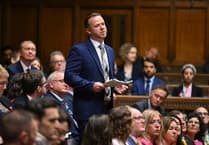CLIMATE activists highlighted the environmental effects of animal agriculture on planetary health to Cornwall councillors at their full council meeting on July 16.
Plant-based Councils is a grassroots campaign that calls on UK councils to take climate action by promoting plant-based eating to their residents and to lead by example with 100 per cent plant-based internal catering. It is one of a number of Animal Rising projects that aims to achieve the transition to a plant-based food system to address the climate crisis and to free up vast amounts of land. It argues that this is the most effective answer to the climate and nature emergencies.
The initial request to Cornwall Council was that it follows the example of other councils such as Oxford, Cambridge and Exeter by transitioning away from animal products in their internal meetings and events whilst also prioritising seasonal foods and drinks. The second stage of the campaign will ask the council to educate local people and also to use what influence it has to call on the government to support the transition. A challenging task - but as we continue to experience extreme weather events, we must adapt.
Posters displayed showed greenhouse gas (GHG) emissions, ocean acidification, eutrophication and land and water use in relation to common food stuffs such as beef, cheese, fish and eggs and compared these with tofu, pulses, peas and nuts. Switching to a plant-based food system reduces ocean acidification, GHG emissions and eutrophication.
All councillors were given a leaflet-entitled “Vegan for the Environment: Saving our Planet with Plant-Based Diets”. They were also asked to consider how the council will help farmers transition away from animal agriculture.
Although Cornwall Council made no decisions at this meeting, there was much interest and many questions were posed and answered.
David Attenborough has written: ‘If we shift away from eating meat and dairy and move towards a plant-based diet, then the sun’s energy goes directly to growing our food. And, because that is so much more efficient, we could still produce enough to feed us using a quarter of the land.”
Article from Climate Action St Austell (CASA).





Comments
This article has no comments yet. Be the first to leave a comment.